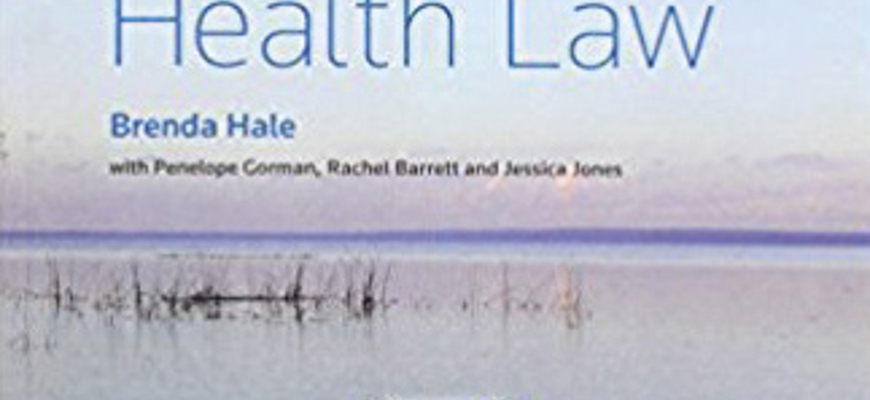Book reviews

Mental Health Law
6th edition
Brenda Hale
PUBLISHER: SWEET & MAXWELL
ISBN: 978-0414051201
PRICE: £85
Of three pieces of information on the cover of this book, one is revealing, but the others conceal the full story. “Sixth edition” indicates that the first edition of this book must have been long ago. In fact it appeared over 40 years ago in 1976, and it has indeed now run to six editions, all with the same author. I am not sure whether that is a record for a legal textbook: I would not be surprised if it is.
That the author appears on the cover simply as “Brenda Hale” will surprise no-one who knows her, but does rather conceal the remarkable career of the then Brenda Hoggett, a lecturer in law at the University of Manchester, who wrote the first edition, through to the present Baroness Hale of Richmond, Deputy President of the Supreme Court of the United Kingdom, whose views on the large area of law covered by this book are likely to be of interest to anyone dealing with matters which could come within the jurisdiction of that court. The author was certainly a pioneer in writing about these subjects with sufficient clarity for interested non-lawyers: something which several of us have attempted to emulate in at least some of our output, and a quality well maintained by her through into this latest edition.
The relationship between the one-time lecturer as author, and the highly respected judge, is explained with the clarity and simplicity of language characteristic of the whole book. The views expressed in the book “are, of course, the views of an author aiming to provoke thought and stimulate debate and not the views of a judge deciding a real case. The judge’s views may end up entirely different in a real case in the real world where she has heard all sides of the argument”.
That the coverage of the book is so wide is also a matter now somewhat concealed by the simple title Mental Health Law. In 1976 that title was adequate. Nowadays, of course, that description is generally taken to mean law covered by mental health legislation, whereas the coverage of this book includes a full treatment of mental capacity legislation, and other areas of law. If there is a Scottish equivalent, it would be Mental Health, Incapacity and the Law in Scotland, originally by Hilary Patrick, the second edition of which by Jill Stavert was recently reviewed in these pages. Should a Scottish lawyer equipped with that text, and perhaps with the several other Scottish texts on these areas of law, be recommended to read Lady Hale’s book? Yes, Scots lawyers should read it for two reasons, but subject to caveats.
They should read it, first, for the clarity and thoughtfulness of the author’s introduction to the whole subject, from the viewpoint of England & Wales, to be found principally in the introduction and in chapter 1. Secondly, with cross-border issues arising with ever greater frequency in practice, it does – as indicated above – provide a reasonably full account of the wide territory surveyed, written with helpful clarity and many wise insights.
However, the first and principal caveat is that it is written entirely from the viewpoint of the law of England & Wales, and because of that it emphasised at least to this reviewer how substantial and at times fundamental are the differences between that law and the law of Scotland.
The Scottish position is referred to at times comparatively, an example being the rightly favourable comments about the benefit to patients in Scotland of the Mental Welfare Commission (in para 6-052). However, there is no reason for the author to mention for Scottish benefit the principal differences, and she does not do so.
Thus, she summarises briefly and with clarity the decision of the House of Lords in Re F (Mental Patient: Sterilisation) [1990] 2 AC 1, to the effect that the principle of necessity rendered lawful the giving of medical treatment to a patient “incapable of giving a real consent” if it was considered to be in the patient’s best interests. The view that the principle of necessity could not and cannot be stretched so far in Scotland was first explained by this reviewer in The Power to Act (1990).
And the fundamental differences are still with us, for example in the incorporation of that same English & Welsh position in s 5 of the Mental Capacity Act 2005, with no equivalent in Scotland’s legislation; and in the continued reliance of English mental capacity law upon a best interests test, which was rejected in Scotland in favour of the principles which appear in the Adults with Incapacity (Scotland) Act 2000, and which has been clearly rejected by the UN Committee on the Rights of Persons with Disabilities as being inconsistent with the requirements of the UN Convention on the Rights of Persons with Disabilities. Another difference is that, as the name implies, mental health review tribunals in England & Wales review decisions already made, whereas Scotland’s mental health tribunals make decisions.
If there is to be a criticism of the book, it is that it seems to be blind to the cross-border dimension. The Mental Capacity Act 2005 deals with cross-border issues in sched 3 (just as Scotland’s 2000 Act happens to contain Scotland’s provisions also in its sched 3), but sched 3 is not mentioned in the book. Even though the approach is narrowly territorial, reality is that there are – for example – many Scottish and overseas powers of attorney being operated, or attempted to be operated, in England & Wales. Difficulties are exacerbated by guidance from the Public Guardian for England & Wales suggesting that powers of attorney are only operable within the jurisdictions in which they were granted, which is incorrect in law. Clarification of such matters by Lady Hale would have been helpful, and failure to cover cross-border issues (of which another example is the frequency with which people with habitual residence elsewhere receive specialist treatment, or are placed in specialist facilities, in England & Wales) has to be seen as a shortcoming of the book.
The only other shortcoming which a reviewer is obliged to mention is not attributable to the author. As this reviewer has pointed out before, the usefulness of any legal textbook to busy practitioners depends – initially – upon the quality of indexing and general editorial work. A surprising example of the shortcomings of this book in that regard is the UN Convention on the Rights of Persons with Disabilities. It is to be tracked down in the index under “Disabled persons – UN Convention”, but despite the great importance of that Convention to current practice, the only reference there is to para I-003. Significant references to the Convention in fact appear also in paras I-008, 10-001, 10-006 and 10-015. Even on p 1, the book twice uses the abbreviation “TNS”, which does not appear in the table of abbreviations on the facing page. If one searches long enough, this and other abbreviations do appear in the bibliography towards the end of the book, but the bibliography does not appear to have been adequately updated, referring (for example) to Mental Capacity: The New Law by Ashton and others in 2006, without mentioning the latest, third edition of that work, named Mental Capacity Law & Practice and published in 2015.
While it is necessary to mention such limitations and blemishes to a Scottish readership, that should not detract from the value of Lady Hale’s latest massive contribution to the law of England & Wales.
In this issue
- Neutrality policies in commercial companies
- Court IT: the young lawyers' view
- Human rights: answering to the UN
- Galo and fair trial: which way for Scotland?
- Secondary victims in clinical negligence
- Reading for pleasure
- Opinion: Alan W Robertson
- Book reviews
- Profile
- President's column
- Twin tracks to completion
- People on the move
- Court of the nations
- Second time around
- How to avoid a summer tax scorcher
- Humani nihil alienum: a call to equality
- Sheriff commercial procedure: count 10
- Taking a pay cut: fair to refuse?
- Fine to park here?
- Enter the Bowen reforms
- Home grown
- Limited partnerships: a new breed
- Salvesen fallout: the latest round
- Gambling in football – the Scottish perspective
- Scottish Solicitors' Discipline Tribunal
- Changing sides
- Business drivers
- CCBE comes to Edinburgh
- "Find a solicitor" gets an upgrade
- Law reform roundup
- Thoughts on a frenetic year
- Check those bank instructions
- Fraud alert – ongoing bank frauds identified
- AML: sizing up the risk
- Master Policy Renewal: what you need to know
- Without prejudice
- What's the measure of a ruler?
- Ask Ash






